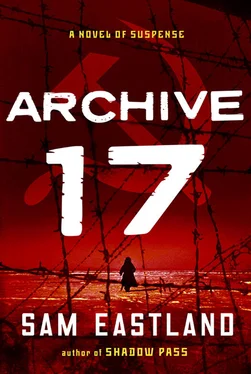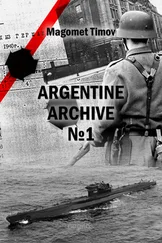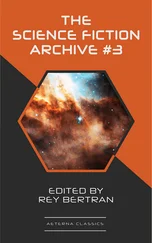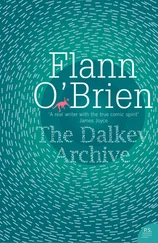Sam Eastland - Archive 17
Здесь есть возможность читать онлайн «Sam Eastland - Archive 17» весь текст электронной книги совершенно бесплатно (целиком полную версию без сокращений). В некоторых случаях можно слушать аудио, скачать через торрент в формате fb2 и присутствует краткое содержание. Жанр: Исторический детектив, на английском языке. Описание произведения, (предисловие) а так же отзывы посетителей доступны на портале библиотеки ЛибКат.
- Название:Archive 17
- Автор:
- Жанр:
- Год:неизвестен
- ISBN:нет данных
- Рейтинг книги:3 / 5. Голосов: 1
-
Избранное:Добавить в избранное
- Отзывы:
-
Ваша оценка:
- 60
- 1
- 2
- 3
- 4
- 5
Archive 17: краткое содержание, описание и аннотация
Предлагаем к чтению аннотацию, описание, краткое содержание или предисловие (зависит от того, что написал сам автор книги «Archive 17»). Если вы не нашли необходимую информацию о книге — напишите в комментариях, мы постараемся отыскать её.
Archive 17 — читать онлайн бесплатно полную книгу (весь текст) целиком
Ниже представлен текст книги, разбитый по страницам. Система сохранения места последней прочитанной страницы, позволяет с удобством читать онлайн бесплатно книгу «Archive 17», без необходимости каждый раз заново искать на чём Вы остановились. Поставьте закладку, и сможете в любой момент перейти на страницу, на которой закончили чтение.
Интервал:
Закладка:
Hesitantly, Pekkala reached out and took one of the pistols. He could tell from the weight that it was fully loaded .
Polivanov measured out twelve paces. At each end he drew a line with his heel in the wet snow .
Maxim Radom walked forward to the line which had been drawn for him. Clasped in one hand was a crumpled piece of paper. Wearing only a shirt above his waist, Radom shuddered with the cold .
Now Kolchak advanced to his line. He held out his hand to Pekkala. “Give me the gun,” he ordered .
Reluctantly, Pekkala handed him the weapon. “Colonel, I beg you to reconsider. What honor can there be in gunning down another man?”
Kolchak did not reply. Instead he opened the cylinder, cocked the revolver, and peered down the barrel at his opponent. Then he spun the cylinder, holding it up to his ear, like a burglar listening to the tumblers of a safe. With a jerk of his wrist, Kolchak closed the cylinder. “Stand aside,” he told Pekkala, and suddenly he did not sound drunk anymore .
Once more Pekkala turned to face the two strangers, still convinced that there might be a way to end this without bloodshed. But there was something about the way they stood, and the grim formality of their expressions, which made Pekkala realize that he was part of something he could not prevent .
Radom unfolded the piece of paper in his hand. “Colonel Kolchak,” he announced in a loud but shaking voice, “I will read the charge against you.”
“Go to hell!” snarled Kolchak. “Do you want to kill me or don’t you?”
Radom flinched, as if the colonel had just spat in his face. With trembling fingers, he attempted to fold up the paper again, but instead he dropped it in the snow. For a moment he stared at it and seemed to be contemplating whether there was more dignity in bending down to retrieve the note or in leaving the paper where it lay .
Before he could make up his mind, Kolchak’s voice thundered once more through the darkness. “Who’s first?”
“The choice is yours,” answered Radom .
In that moment, Pekkala no longer felt the freezing air blowing in off the Neva River. Nor could he hear the sound of laughter and music from inside the Metropole. Even the drifting snowflakes seemed to pause in their descent .
Kolchak examined the revolver in his hand. He turned it one way and then another and the glimmer of the streetlamps winked off its blued-steel barrel. Then, casually, he raised the gun and pulled the trigger .
The sound was flat and brittle, like that of someone breaking a dry stick across their knee .
Maxim Alexeyevich Radom stood perfectly still .
Kolchak missed, thought Pekkala. Thank God, the man is too drunk to shoot straight. Now surely they will call the whole thing off .
Another moment passed before Pekkala realized that he was mistaken .
Radom’s neat dark hair stuck up on one side, like a shard of black glass. Slowly, the man raised his arms out to the side, like someone about to set out across a tightrope. He took one careful step backwards. Then he fell into the slush, the gun tumbling out of his hand .
Pekkala and Polivanov both ran to help the injured man, but there was nothing they could do .
Radom had been shot just above the left eye. His skull had been cracked open and the scalp folded back upon itself. Steam drifted from the hole in Radom’s head .
Radom was still alive but his breathing had become a deep, guttural snore. It was a sound Pekkala had heard before, and he knew that the man had only minutes left to live .
At that moment, the double doors of the Metropole flew open and a woman ran out into the street. Her hair was a dark, tangled mass. She was wearing only a silk negligee, and as she passed through the lamplight, the gossamer fabric seemed to disappear like smoke, leaving her naked in the freezing air .
Stumbling barefoot through the snow, she made her way to where Radom had collapsed. With a wail she sank down next to him, pressing her hands against his bloody face .
Kolchak had not moved since he fired the revolver. Now he shook his head and tossed the gun away .
The lieutenant emerged from where he had been waiting in the shadows and the two men climbed into Kolchak’s car .
That was when Pekkala caught sight of Ilya coming down the road .
He ran to meet her .
“Why is that man lying here?” Her cheeks were rosy in the cold .
“We should go.” Gently he took her by the arm .
“What about the Metropole? What about our dinner?”
“Some other time,” Pekkala replied .
“What happened?” She was staring at the woman in the negligee .
“Please,” whispered Pekkala. “I promise I will tell you later.”
Sitting behind the wheel, the lieutenant started up the car .
Hearing the noise of the engine, the woman in the negligee raised her head. She caught sight of Kolchak in the backseat of the car and let out a scream of sadness and rage .
The car pulled out into the road and drove past, showering them all with icy water .
Pekkala glimpsed a match flaring in the car as Kolchak lit himself a cigarette .
As they passed, the driver turned towards Pekkala .
That man was Lieutenant Tarnowski .
Their eyes locked, and then the car was gone, and the glittering frost which filled the air seemed to close up around it, as if it had never been there .
Kolchak’s duel was the last one ever fought in St. Petersburg. Two days later, the Tsar outlawed this barbaric ritual .
After Tarnowski, there were no more visitors.
It was hunger which preoccupied Pekkala now, no matter how hard he tried to steer it from his mind.
On his fifth day in solitary, Pekkala spotted a cockroach scuttling across the floor. The thumb-sized, amber-colored insect reached the far wall and began to move along it.
Without another thought, Pekkala lunged across the floor and caught it. With nausea rising in his throat, he crushed the cockroach in his fist and ate the mash of legs and shell and innards, mixed with the gray-brown silt, like the ashes from a crematory oven, which he had clawed up from the floor along with the insect.
Pekkala felt no revulsion, knowing that in the Gulags, only those who were prepared to set aside all pretense of dignity would go on living.
To take his mind off the fact that he was starving, he focused his thoughts on the murder of Ryabov. Since arriving at the camp, he had been presented with several possibilities, all of which appeared to circle around the truth. But none of them, as far as Pekkala was concerned, pointed directly at it. Commandant Klenovkin was convinced that the killing had been carried out by the Comitati. Melekov blamed Sergeant Gramotin. The Comitati themselves seemed resigned to their gradual extinction in this place, at the hands of whoever dared to challenge them. For Tarnowski, the killer and his reasons hardly seemed to matter anymore. The only thing they had left to believe in was that their leader would one day return to set them free.
Pekkala admired the Comitati for the depth of their faith, but for that same reason he also pitied them. Even if Kolchak had promised to return someday, Pekkala did not believe that the colonel would keep his word. Although Pekkala had not been well acquainted with Kolchak, he knew precisely the kind of man the Tsar would have chosen for such an important task. Kolchak may have selected the men under his command for their loyalty to him, but the Tsar had picked Kolchak for his ability to carry out the mission, no matter what the cost in human life. That mission was to transport the gold. For such a task, cold blood, not compassion, was required. Once his soldiers had fallen into captivity, Kolchak would have weighed the risks of trying to free them and realized that the odds were too great. What the men under Kolchak’s command had never been able to accept was that they were, in the eyes of their leader, expendable.
Читать дальшеИнтервал:
Закладка:
Похожие книги на «Archive 17»
Представляем Вашему вниманию похожие книги на «Archive 17» списком для выбора. Мы отобрали схожую по названию и смыслу литературу в надежде предоставить читателям больше вариантов отыскать новые, интересные, ещё непрочитанные произведения.
Обсуждение, отзывы о книге «Archive 17» и просто собственные мнения читателей. Оставьте ваши комментарии, напишите, что Вы думаете о произведении, его смысле или главных героях. Укажите что конкретно понравилось, а что нет, и почему Вы так считаете.











